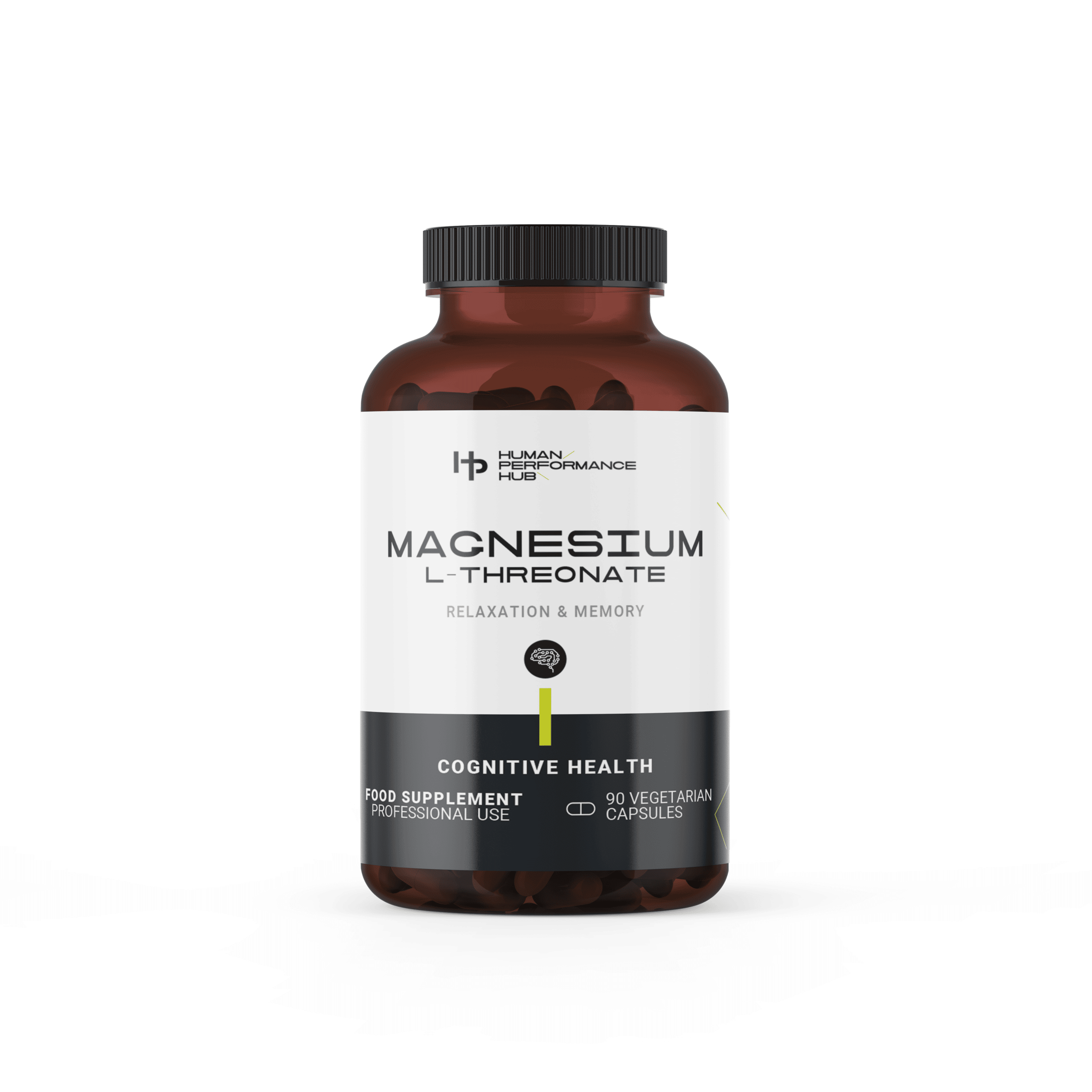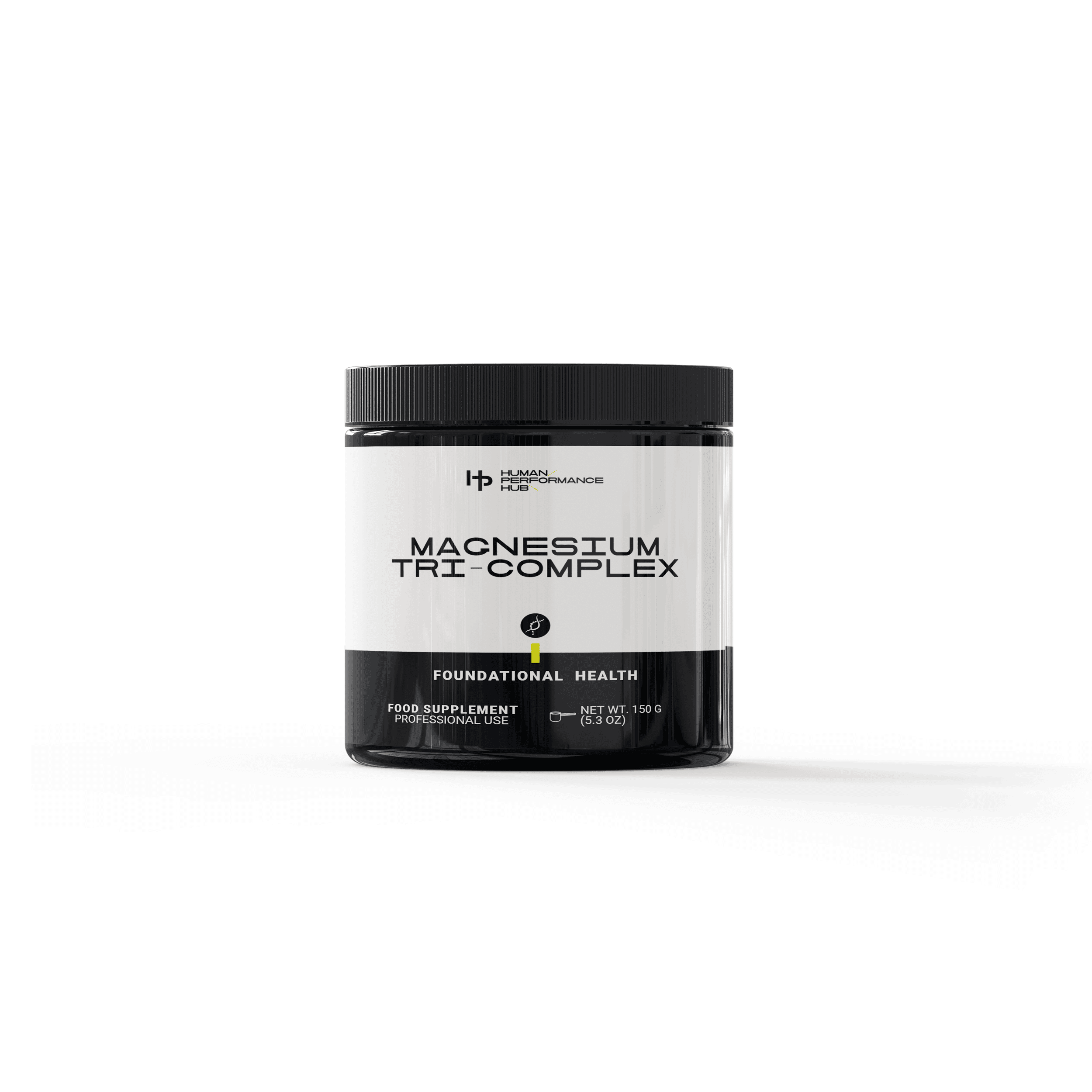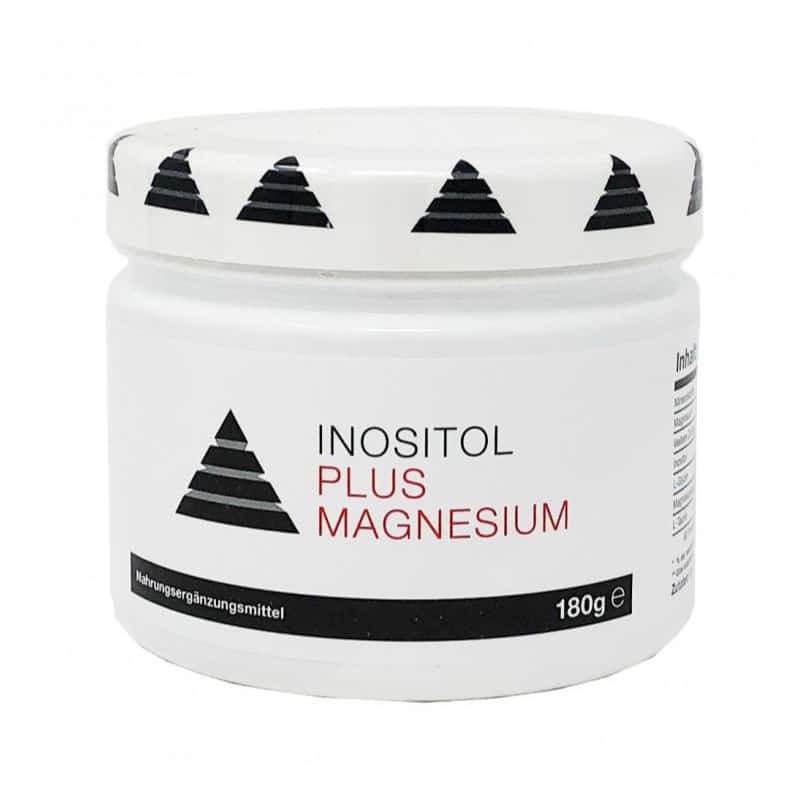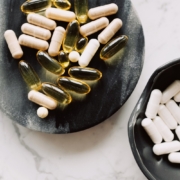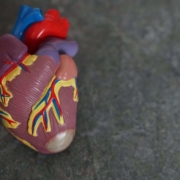In this article, we take a look at some slumber strategies and supplements to help you improve your sleep.
You probably know how essential sleep is to your health and wellbeing. As discussed in my last article, sleep is the first one out of the three things I look at to help get faster results with my clients in the gym and in life.
There is a lot of information and things to consider for obtaining better health and results through sleep. It is not my intention to make things unrealistic and set you up to fail with a list of things as long as your arm to change.
The principle I work within my own life and with my clients is the ONE THING. It is all about making atomic habits and seeing the outcome unfold over time. The words I use a lot with people are “is this realistic and sustainable?” If not, let’s go back and decide what is. If it’s great, let’s move forward and make it a habit (it takes around 66 days for a habit to become second nature).
In short, I’m giving this information for you to have a better understanding of sleep. Looking at sleep through a straw, the ‘FINE’ approach is not going to help you get great results.
In this article, I will go through the things I practice with myself and my clients. As you are aware, I am not a doctor or a scientist. The information I give out is what I know and see works with my experience dealing with real people and real life.
Just remember everyone is on a continuum, there is no ‘one size fits all’ approach. It’s about trying things and seeing what works. Keep it realistic and sustainable and results will show – success breeds success. If you feel you need some personalised guidance, don’t hesitate to contact me and book in for an online consultation. We can go through things together and see where the best place to start is.
A great day begins with a great night’s sleep!

Build the perfect day
We need to fill our day as best as we can. As I went through in the last article, our body goes through Zeitgebers Circadian Rhythm (ZCR). We should look to achieve this every day to set us up for optimal sleep and recovery.
The foundations for a perfect day involve healthy routines and consistency.
Morning
- Breakfast – quality protein and healthy fat-based food (see the Top 5 energy kick-starters)
- Physical activity and natural light
Afternoon
- Lunch
- Snack
- Nap
Evening
- Dinner – you can look to add in your carbohydrates depending on the demand of the day and your body fat %.
- Bedtime routine
Routine, routine, routine
Consistency is the key to establishing regular sleep patterns. Just like instilling routine in children helps to keep them growing and developing, adults need a routine to prosper.
Go to bed in your bed and wake up at the same time every day . You must tell the body when to get ready to sleep and choose your waking hour consistently. This helps get your body clock get into a regular rhythm.
Do this, especially at the weekend. Staying up late and sleeping in disrupts the bio-clock to a similar, smaller margin than an international flight – so-called ‘social jet lag’. This is one of the reasons why Monday mornings are statistically the toughest day of the week.
And when it’s time to sleep, make sure you always sleep on your bed, not the armchair or couch. Your bedroom should be the only place you sleep, so avoid using it for other things like eating, working, or watching TV. Sex is optional.
Relax before bed. Don’t “try” to go to sleep. When you focus and concentrate, you are really telling the body to increase your wakefulness. So you need to do the opposite of what you are trying to do. Relaxing routines will help.
A regular bedtime routine to help you relax can promote better rest, recovery and sleep. You might like to wind down by reading a book or listening to music to bring your body into a calm state where a good night’s sleep is more likely to follow. Listening to classical music, such as Johann Sebastian Bach, has a calming effect on the nervous system, similar to meditation. This is a great way to wind down your system and help you fall asleep quicker and sleep deeper.
A hot bath before bed, hot being the operative word, can help you relax. Research shows the difference in the temperature of a hot bath to a cold room to sleep has a much greater effect on the circadian rhythm than just a hot bath. And for an added sleep boost, use Epsom salts in your bath. Epsom salt is a combination of magnesium and sulphur. It’s primarily absorbed through the skin and has a localised relaxation effect this way. It is also the most simple way to help muscle soreness.
I like to do a gratitude practice by asking myself 4 questions out loud. I know this sounds a bit silly, asking yourself questions out loud, but this is one of the most successful tools I have used on myself. It puts everything into perspective, getting it out in the open and out of my head. The questions I can’t answer or have a difficult time with, turn out to be what I need to concentrate on the next day.
- What am I most grateful for today?
- What did I learn today?
- Who has helped me today?
- Who have I helped today?
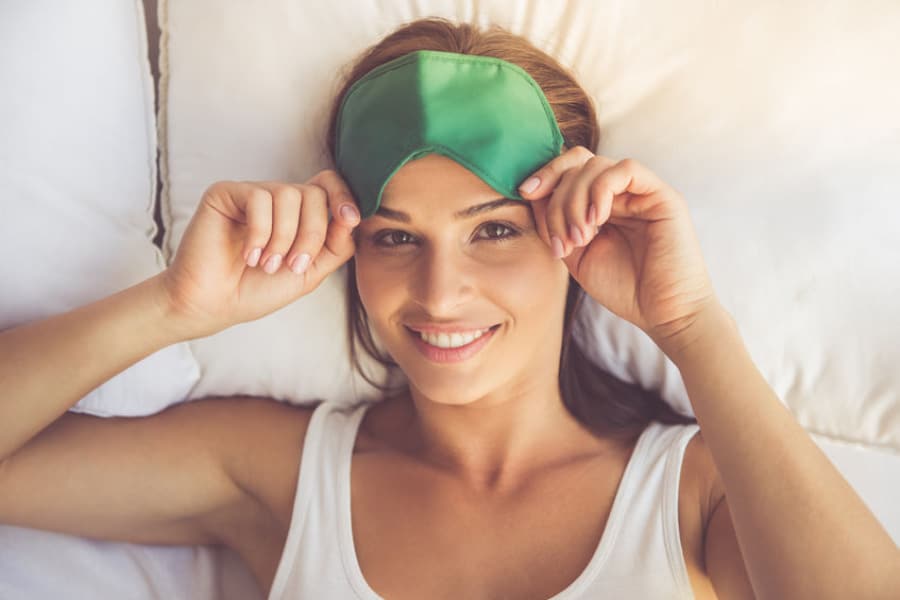
Create the perfect sleep environment
A relaxing and comfortable bedroom environment that is well-ventilated, quiet, and dark plays an important role in promoting restful sleep. Colour also has an effect on your moods so surround yourself with soothing colours.
Eliminate light
Any kind of light can affect your sleep cycle. Eliminating light is one of the best things you can do for good sleep. That means natural light as well as man-made lights and blue lights from electronics. Even your alarm clock can emit undesirable light, as well as cause your brain to kick in if you wake up in the night and check the time.
As well as shutting off all light-emitting devices, dark shades and an eye mask can help.
Keep it quiet
Your brain doesn’t shut down when sleeping. So even when you’re sleeping, sounds can wake you and impact your sleep cycle. Earplugs may help shut down your auditory sense.
Keep it cool
The ideal temperature for sleeping is 60 to 68 degrees Fahrenheit or 15 to 20 degrees celsius. Temperatures that fall too far above or below 60-68 degrees can cause restlessness. When you sleep your body’s internal temperature goes down, so if you’re too hot or too cold your body will struggle to achieve the internal temperature that helps induce sleep. A good tip is to make sure you don’t have the heating on in the bedroom.
Make sure your bed is comfortable and the right size
Ensure you have a supportive mattress. Also, pay attention to mattress size. Children usually have beds in proportion to body size. However, when you’re older and share a bed, you’re in a smaller space than your body is used to. The correct bed size for two grown adults is a king.
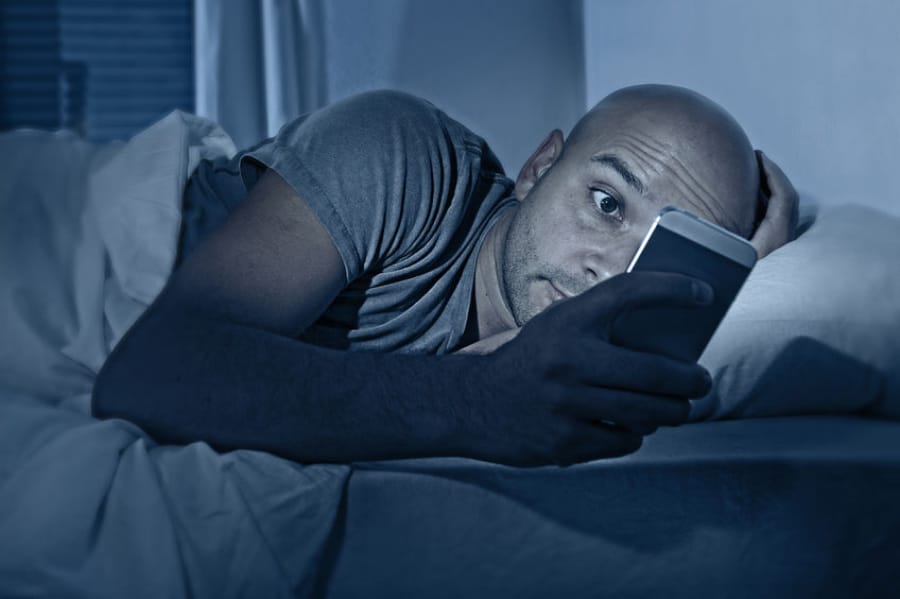
Reduce blue-light exposure
More important today than ever is the exposure we get from electromagnetic radiation (EMR) from wireless internet connections, mobile phones, tablets, computers, even smartwatches and fitness trackers.
Recent studies have shown that short-wavelength [blue] light has a greater effect on phase shifting the circadian clock and suppressing the sleep-inducing hormone melatonin. One study showed that melatonin levels were 44% lower at 2 am in those exposed to mobile phone signals, compared to those who weren’t.
Also, participants who read on light-emitting devices took longer to fall asleep, had less REM sleep [the phase when we dream], higher alertness before bedtime, and were sleepier and took longer to wake up after an eight-hour sleep episode.
So it may be worth reducing exposure by purging all electronic screens from the bedrooms, shutting off your wifi, and turning off your cell phone and other devices like tablets and computers.
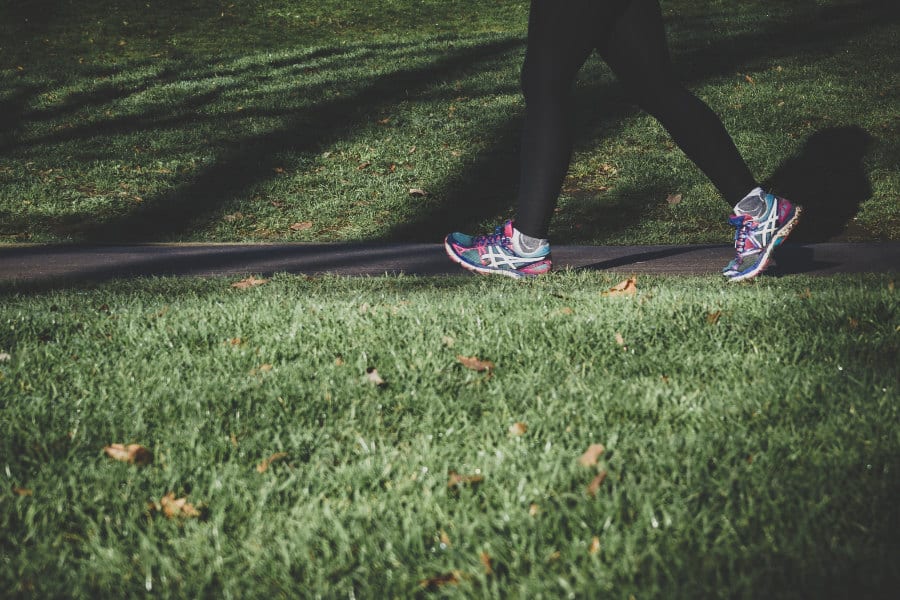
Get outside and move
Get as much natural light as possible during the day, especially in the morning. This helps your body produce melatonin. Even a short 15-minute walk outside every day is good to get needed light, as well as exercise.
Physical activity and exercise can help you to sleep longer and better. But if you’re having trouble getting to sleep, don’t exercise too close to bedtime. The stimulation and increase in body temperature can make it harder for you to fall asleep.
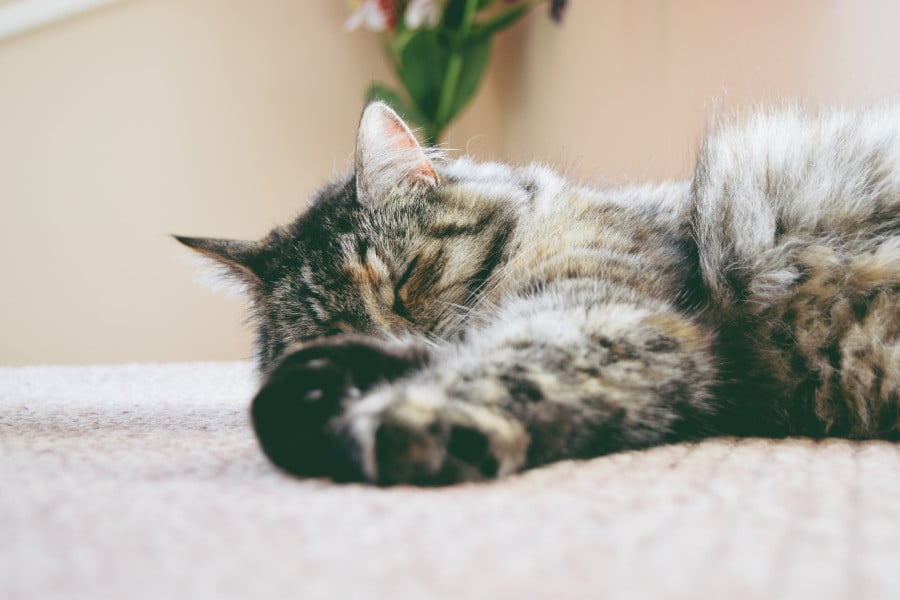
Grab a catnap if you’re tired
Naps are great if your sleep is good, but they don’t compensate for a lack of sleep. But if you’re tired, a short nap (20-30 minutes maximum) can benefit without leaving you feeling groggy or interfering with nighttime sleep.
And having a nap in the day may help to reduce some of the health risks of poor sleep.
Results of a study of 23,681 healthy adults between 20 and 86 over 6 years found that those who nap at least 30 minutes three times a week or more have a 37 per cent lower risk of coronary mortality than those who did not sleep during the day.
If you can, schedule naps in your diary. It’s best to take a nap before getting to a state where you’re so exhausted. So, for example, if you get tired at 4 in the afternoon, take a nap at 1:30 / 2:00 maximum. You don’t want to get into a deep sleep when you nap!
Since your sleep environment can affect your ability to fall asleep, make sure you have a comfortable and quiet place to lie down. Prep yourself as if you were going to bed. Get on your sleep mask to tell your body rest is coming.
And don’t stress about sleeping. Harvard studies have shown there’s no difference if you sleep or just rest – it’s all psychological.
Thomas Edison only slept 4 hours per night. But he was also really big on napping, combining his sleep/recovery to 8 hours or more.
I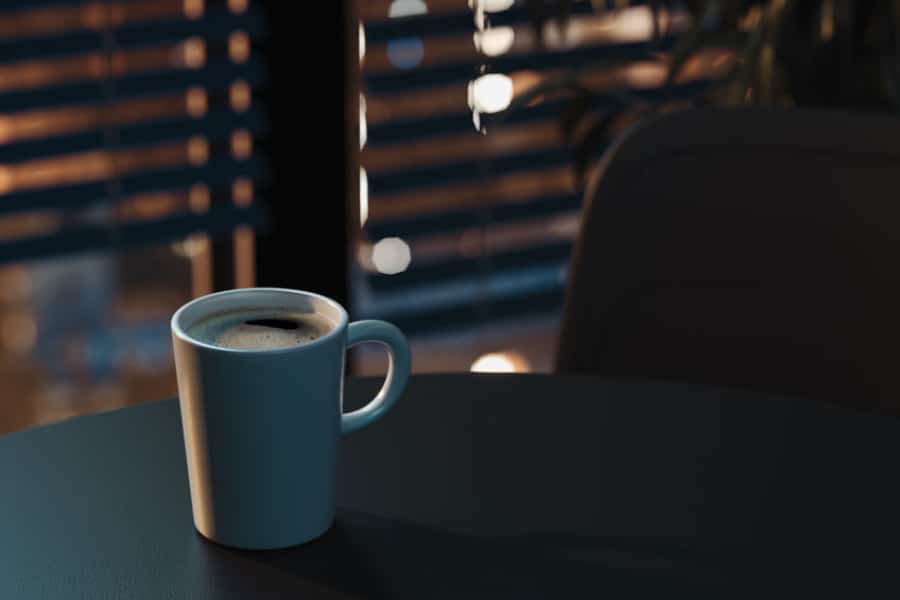
Avoid caffeine
If you want a good night’s sleep, watch how much caffeine you’re putting in your body. Not only can caffeine affect your ability to fall asleep, but it can also prevent you from staying asleep and reaching the deep sleep levels so critical to restore and repair your body.
Caffeine blocks the activity of adenosine, a chemical that accumulates in your brain as the day goes on. The more adenosine you have in your brain, the more tired you’ll be. That’s why you might enjoy the effects of your cup of coffee as a pick me up, but having it too late in the day can cause problems with your sleep later on.
Caffeine also suppresses melatonin, the ‘sleep hormone’ for up to 10 hours. So even if you think caffeine doesn’t affect you, avoiding caffeine 6 to 8 hours before bed can help you fall asleep easier and avoid waking up in the night.
So if you already have difficulty sleeping, avoid coffee, black tea, chocolate, energy drinks, cola, and drugs containing caffeine in the late afternoon and evening.

Skip the booze
Many people use alcohol to relax. Drinking alcohol may make you feel drowsy at first, and even more if you’re sleep-deprived.
It’s true that alcohol may help you fall asleep quicker because of its sedative effect.
But here’s the thing.
You might think that alcohol helps with your sleep, but research suggests you may end up with lower quality sleep overall.
The sleepy effect brought on by alcohol wears off and you’re more likely to wake up or toss and turn, reducing your overall time spent asleep. Alcohol has the effect of dropping your blood glucose causing a hypoglycaemia consequence when you are sleeping.
Also, alcohol decreases REM sleep, the deep sleep where you dream and the recuperation phase for the body and brain.
Regular alcohol consumption depletes GABA, which leads to more adrenalin, anxiety and emotional oversensitivity and less good quality of sleep. One study found that men who drank more increased their risk of sleeping problems by 25 per cent.
Drinking alcohol close to bedtime may also worsen snoring, trigger sleep apnea, and lead to a chemical disruption of sleep.
As with anything, moderation is key. Enjoy an evening tipple, but don’t overdo it so that it affects your sleep.

Pay attention to your food
Eating a balanced diet will help prevent spikes and crashes in blood sugar that can disrupt your sleep.
- Eat high-quality proteins and healthy fats for breakfast. Carbs in the morning have a negative effect on your biorhythm and therefore on the ability to fall asleep and the quality of your sleep.
- Eat foods high in tryptophan. A key component of serotonin, tryptophan can promote relaxation when it’s released in the brain and help prime the body for sleep. Tryptophan-rich foods include turkey, goat’s and sheep’s milk.
- Eat gluten-free foods. Gluten is a protein found in cereals, especially wheat. It’s the most common food intolerance and is also highly inflammatory. Suffering increased inflammation in the body can have a negative effect on sleep. Avoiding gluten is one of the missing links in improving sleep quality.
- Eat whole-food carbohydrates in the evening to help you sleep faster. Eating carbohydrates activate the orexin pathway, which makes you feel sleepy. However, carb intake varies from person to person and from activity to activity. To maximise progress, recovery and cognitive performance, carb intake must be optimised to meet individual needs. The three most important factors I like to use to determine the amount of carbs are body fat %, muscle mass, and activity level. Low carb week = 1 carb meal, high carb week = every meal but breakfast. Each person needs to lie somewhere on this continuum.
Fat loss tip: Never skip breakfast. Don’t start your day on an empty stomach. Eat at least a handful of nuts or seeds. This will stabilise your blood sugar and energy levels and prevent cravings throughout the day.
Take sleep-promoting supplements
Sleep is vital for helping your body and brain work properly. Yet people increasingly suffer from poor sleep.
While good sleep practices and habits help, it may not be enough for some. If you require a little extra help, Human Performance Hub stocks a range of sleep-promoting supplements from the world’s leading suppliers.
Please contact me to book an online consultation for advice and personal recommendations.
Melatonin
Melatonin, the “sleep hormone”, improves sleep by helping the body regulate its biological clock and sleep-wake cycles. Higher levels of melatonin may improve the quality of sleep and reduce daytime sleepiness and fatigue, as well as increasing REM sleep.
Melatonin supplements are useful for regulating sleep and the body’s daily rhythmic cycle, making them ideal for jet lag. Melatonin is also an important antioxidant that acts as an effective scavenger of free radicals.
Melatonin levels in your body are typically higher in winter than in summer, which is why you may be more sleepy in the winter. A good way to help balance melatonin levels is to take it in the morning and build it up throughout the day to help your biological clock in the afternoon. This is more effective than just taking melatonin in the evening.
*Note: Melatonin plays an important role in the body’s maturation and should not be given to children.
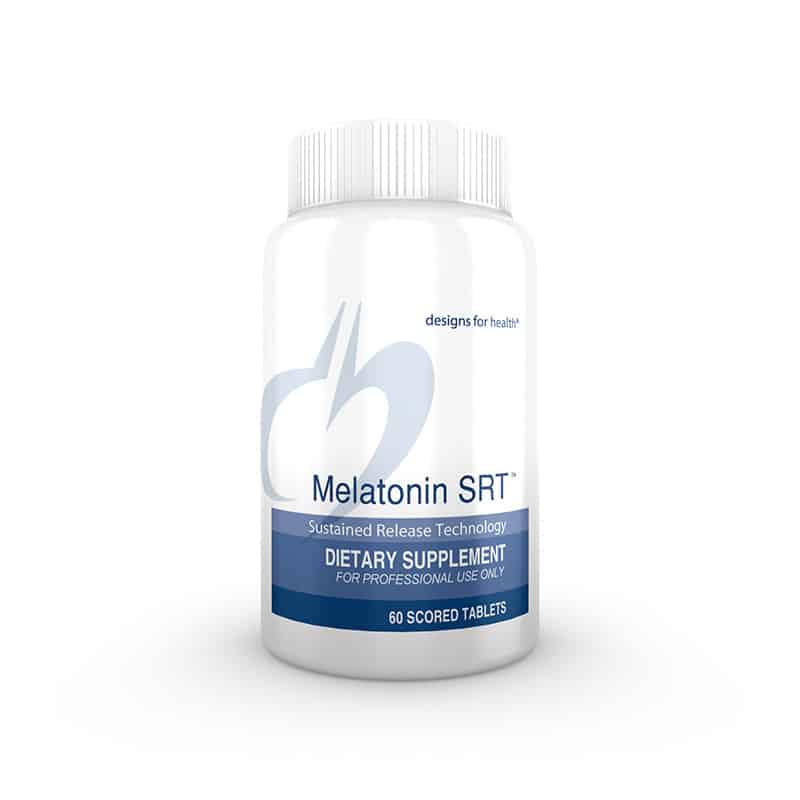
Designs for Health Melatonin SRT™
Provides 6 mg melatonin in a sustained release tablet. Made with non-GMO ingredients. 60 tablets £24.50
Magnesium
Magnesium is about as close as you can get to an all-around sleep and health supplement. Because of its role as an enabler of healthy enzyme function, magnesium plays an important part in most physiological functions.
Keeping magnesium levels healthy can lead to deeper, more sound sleep. Research indicates supplemental magnesium can improve sleep quality, especially in people with poor sleep.
For more information about magnesium, see Zinc and Magnesium Essentials.
Magnesium glycinate works to lower cortisol and detoxify. Magnesium citrate does not work for sleep.
Human Performance Hub carries a range of magnesium supplements with different formulations.
Human Performance Hub’s Magnesium Bisglycinate
A magnesium supplement would be perfect if you are looking to improve your sleep, and also if you are looking to recover better between workouts. This is because it brings the nervous system to a more relaxed state, which is important for sleep and after a workout when you will have been more alert.
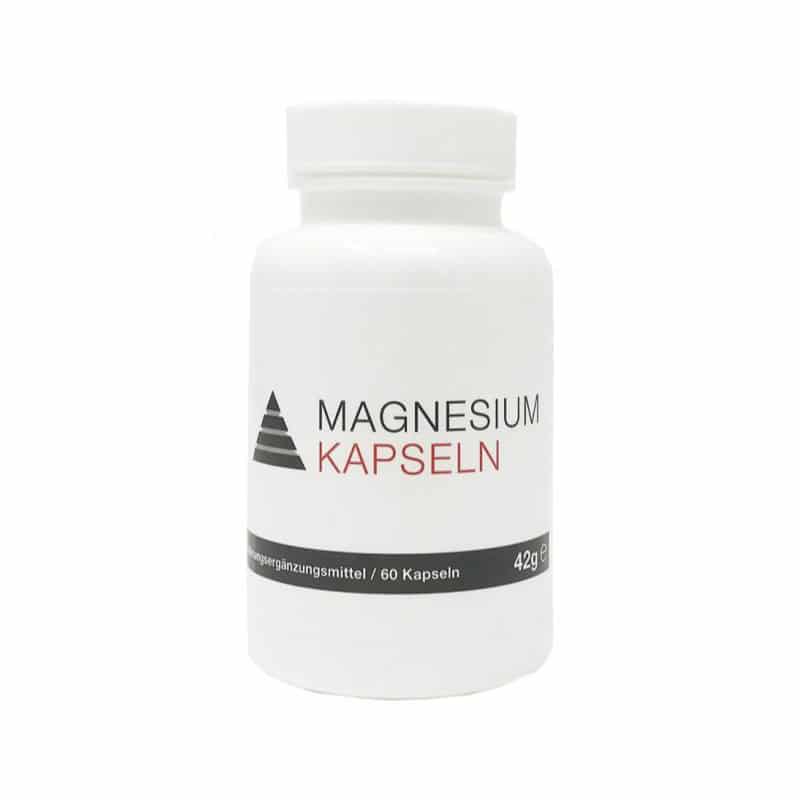
YPSI Magnesium Kapseln
These magnesium capsules are the strongest we supply, with 525 mg per capsule. Comprises 3 different magnesium forms,
magnesium bis-glycinate, magnesium aspartate and magnesium citrate to ensure good bioavailability. Made in Germany, certified gluten-free, and suitable for vegetarians and vegans. 60 capsules £30.00

Designs for Health MagCitrate Powder
This great-tasting lemon flavoured powder provides 300 mg of magnesium in each teaspoon serving. Mixes in water or juice for superior absorption. Helps promote bowel relaxation when fibre alone is not enough and supports the ability to sleep. Can be taken along with our Inositol Powder to further promote restful sleep. Made with non-GMO ingredients.
Human Performance Hub Magnesium L-Threonate
Human Performance Hub Magnesium L-Threonate uses the unique, patented, chelated mineral Magtein™ containing magnesium chelated to threonic acid (magnesium L-threonate). Its ability to get through the blood-brain barrier to transport magnesium ions to brain cells may support cognitive abilities and decrease common age-related memory decline. Made with non-GMO ingredients.

ATP Lab Mind Mag
Mind Mag has the unique ability to affect brain levels of magnesium as the only form that can easily cross the blood-brain barrier. By doing so, this form of magnesium lends itself to some very impactful benefits for overall brain function and performance. Recommended for symptoms of short-term memory loss, recovery from head injuries, ADD challenges, or to prevent neurological decline. 90 capsules £40.00
Human Performance Hub Magnesium Tri-Complex
Magnesium Tri-Complex is a unique blend of three highly absorbable forms of magnesium designed to support cardiovascular health.* One serving provides 300 mg of elemental magnesium in an easy-to-mix powder. 150g £45.00
Inositol
Low serotonin levels contribute to sleep difficulties. Research shows that Inositol activates serotonin and communicates with the GABA receptors in the brain to reduce the anxiety that can cause insomnia and promote calmness. Taking Inositol before going to bed promotes healthy serotonin levels to calm and relax your body, helping you to sleep better.
Glycine is an amino acid that is a relaxing neurotransmitter itself, reducing the hormone cortisol, relaxing the muscle and supporting liver function.
YPSI Inositol plus Magnesium
Mix this effective powder in water or juice to release the benefits of YPSI inositol plus magnesium. Contains a composition of inositol and magnesium, as well as the amino acids L-glycine and L-taurine. 180g per can, 60 servings per can. £35.00
Taurine
Taurine is found mainly in meat and seafood so unless you eat this every day you probably don’t get enough. Vegetarians are at risk of not reaching the requirements for taurine. Taurine is also depleted with stress and heavy exercise.
Taurine raises the GABA levels in the brain, which has a calming effect on the nervous system. Taurine can enhance your sleep by helping with anxiety and running thoughts that keep you awake. Taking too much will make you feel sick as it is a GABA inducer.
Tip: If you are using phenibut and wake up with a foggy brain, it is pulling too much GABA through the blood’s brain barrier. Take away or reduce the dose of the phenibut.
HPH Taurine
Taurine capsules deliver effective doses of this sulfur-containing amino acid. Non-GMO ingredients.1 g per capsule. 120 capsules £19.00
Bonus supplements for sleep
Multivitamin
Adding a multivitamin before bed will help detoxify. Recommended usage: 3-9 per day.
Greens Blend
This will help with early morning waking at 3 am (liver) 5 am (lungs) 7 am (colon).
Liposomal GSH
This helps the liver and the production of glutathione.
Carbohydrates
I use carbohydrates to improve sleep if they are deserved. There are a few methods that I use. One is using two measuring skinfold sites from skinfold callipers (Harpenden) that determine the amount of carbohydrates the client can tolerate.
Subscapular / Shoulder blade The subscapular site correlates with your genetic tolerance to carbohydrates. The lower the fold of skin the better your body metabolizes carbohydrates. The magic threshold is 10mm. If you have a subscapular reading of 10mm or below it is an indicator that your body is insulin sensitive and can handle starchy carbohydrates effectively. With scores above this, your body will respond better to predominantly fat and protein-based meals with carbohydrates introduced sporadically.
Supra iliac / hip This is directly correlated to carbohydrate consumption. If you eat more carbohydrates than your body can handle this site will go up. The ideal score for males is 6mm and 10mm for females.
The other method I use is Continuous Glucose Monitoring (CGM).
A CGM device measures sugar levels every couple minutes for a full 24 hours per day via a small sensor with a small needle under the skin, which then gives one a full curve of blood sugar response to meals and daily life situations. This makes a CGM device the best option to measure blood sugar responses to each individual client. This method is not a shortcut, as the basics still need to be covered first.
Please contact me and book an online consultation for advice and personal recommendations.
Jet lag protocol
Jet lag is that sluggish feeling you get when your normal sleep pattern is disturbed after a long flight crossing multiple time zones. Typically, you’ll feel worse when you’re travelling east due to losing time. Going west is easier as you’re moving with time.
In general, the body adjusts to the new time zone at the rate of one or two time zones per day. For example, if you crossed six time zones, the body will typically adjust to this time change in three to five days.
Jet lag is temporary and most people will recover within a few days. However, to minimise the effects, you should adjust as fast as possible to the time zone. Go to bed the normal time you would in your home country and wake up at the same time. Set an alarm to wake you up and stick to the morning routine (high-quality protein and healthy fats for more drive, concentration and attentiveness during the day, and coffee for the added boost of caffeine).
Protocol:
- Magnesium / Multivitamin (B6)
- Melatonin
Top 5 kick-starters for energy
- Fresh lime juice from one lime, a pinch of pink salt in a glass of filtered water
- Licorice Extract, 1-4 at breakfast
- High-quality protein and healthy fats for breakfast
- Multivitamin 3-9 per day
- Bonus – Coffee
Please contact me and book an online consultation for more advice about dealing with jetlag.
Sleeping well means looking forward to your day, not looking forward to getting back into bed. Boost your sleep today!
Every step towards optimising your health is a step towards getting and feeling better. By ensuring that you get the basics right first, you’re that much closer to your best health and wellbeing.
All the information I’ve learnt to write this article and help my clients achieve their results has come from all mentors I’ve had over the years. I am deeply grateful to Wolfgang Unsold and Christian Maurice for sharing their knowledge on sleep and achieving better energy.
Disclaimer
Always speak with your physician or another healthcare professional before taking any nutritional & lifestyle changes or before taking any nutritional supplement. For more information, please view our terms & conditions.
Further reading
- The Science and Sensibilities of Sleep
- The Brain Chemicals that Boost Sleep and Recovery
- Why Magnesium is important for optimal health and performance
- SynerMag
References
- Oral Mg(2+) supplementation reverses age-related neuroendocrine and sleep EEG changes in humans
- L. Shilo et al., ‘The effects of coffee consumption on sleep and melatonin secretion’ Sleep Medicine, 2002;3(3):271-3
- P. Peppard et al., ‘Sleep disorders linked to heavy drinking in men’, Journal of Clinical Sleep Medicine, April 2007
- S. Jarupat et al., ‘Effects of the 1900 MHz electromagnetic field emitted from cellular phone on nocturnal melatonin secretion, J Physiol Anthropol, 2003;22:61-63
- A. Naska et al., ‘Siesta in Healthy Adults and Coronary Mortality in the General Population, Archives of Internal Medicine, 2007, vol. 167, pp. 296-301


